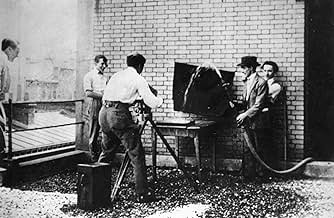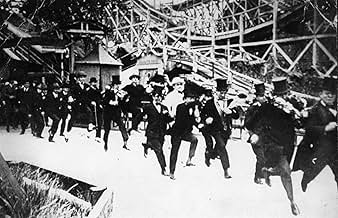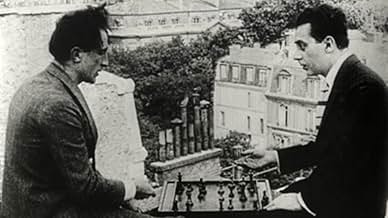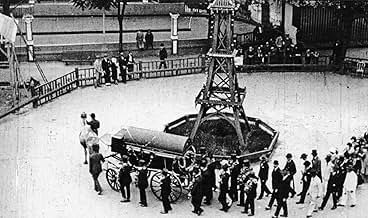Entr'acte
- 1924
- 22m
IMDb RATING
7.3/10
4.4K
YOUR RATING
An absolute dada movie. Somebody gets killed, his coffin gets out of control and after a chase it stops. The person gets out of it and let everybody who followed the coffin dissapear.An absolute dada movie. Somebody gets killed, his coffin gets out of control and after a chase it stops. The person gets out of it and let everybody who followed the coffin dissapear.An absolute dada movie. Somebody gets killed, his coffin gets out of control and after a chase it stops. The person gets out of it and let everybody who followed the coffin dissapear.
Inge Frïss
- La ballerine
- (as Mlle Frïss)
Man Ray
- Un joueur d'échecs
- (as Man-Ray)
Marcel Achard
- Un homme qui suit le corbillard
- (uncredited)
Georges Auric
- Un homme qui suit le corbillard
- (uncredited)
Georges Charensol
- Un homme qui suit le corbillard
- (uncredited)
Georges Lacombe
- Un homme qui suit le corbillard
- (uncredited)
Roger Le Bon
- Un homme qui suit le corbillard
- (uncredited)
Jean Mamy
- Un homme qui suit le corbillard
- (uncredited)
Rolf de Maré
- Un homme qui suit le corbillard
- (uncredited)
Erik Satie
- Un homme qui charge le canon
- (uncredited)
Pierre Scize
- Un homme qui suit le corbillard
- (uncredited)
Louis Touchages
- Un homme qui suit le corbillard
- (uncredited)
- Director
- Writers
- All cast & crew
- Production, box office & more at IMDbPro
Featured reviews
Rene Clair and the Marx Brothers once decided to make a movie together: it's a shame that it never happened. Maybe that movie exists in some alternate universe, and I'll bet it's hilarious. I enjoyed "Entr'acte", but I'd gladly trade this film for a chance to see Rene Clair's Marx Brothers movie.
Another IMDb reviewer has synopsised the plot, such as it is: a man apparently dies. After his funeral, his coffin escapes from its hearse, and then the man returns to life. The title "Entr'acte" (an interval between theatrical acts, or an intermission) is never explained; maybe it refers to the interval between that man's two lives. I prefer to think that Clair meant this somewhat amateurish film as a mere intermission: an amusing bit of fun between the acts of his 'real' films; the ones with coherent story lines.
Some of the content in this film truly does seem to be unintentional. After the central character's funeral, there's a stiff wind blowing outside the chapel. The women in this movie wear elaborate long dresses, and the wind animates their clothing in a way that's distracting rather than funny, and surely not meant to be symbolic.
Much of the imagery in this movie seems to be pure Dada rather than signifying anything. The man's funeral cortege is led by a camel. If there's any underlying significance there, I doubt that it amounts to much. Earlier on, I was intrigued by one sequence featuring Parisian chess players. While the camera focuses on the chessboard, a shot of Parisian traffic is superimposed: suggesting that all humanity are pawns in some cosmic chess game.
Don't look for too much meaning in "Entr'acte". It's an amusing experiment, but might have been more effective at a shorter length.
Another IMDb reviewer has synopsised the plot, such as it is: a man apparently dies. After his funeral, his coffin escapes from its hearse, and then the man returns to life. The title "Entr'acte" (an interval between theatrical acts, or an intermission) is never explained; maybe it refers to the interval between that man's two lives. I prefer to think that Clair meant this somewhat amateurish film as a mere intermission: an amusing bit of fun between the acts of his 'real' films; the ones with coherent story lines.
Some of the content in this film truly does seem to be unintentional. After the central character's funeral, there's a stiff wind blowing outside the chapel. The women in this movie wear elaborate long dresses, and the wind animates their clothing in a way that's distracting rather than funny, and surely not meant to be symbolic.
Much of the imagery in this movie seems to be pure Dada rather than signifying anything. The man's funeral cortege is led by a camel. If there's any underlying significance there, I doubt that it amounts to much. Earlier on, I was intrigued by one sequence featuring Parisian chess players. While the camera focuses on the chessboard, a shot of Parisian traffic is superimposed: suggesting that all humanity are pawns in some cosmic chess game.
Don't look for too much meaning in "Entr'acte". It's an amusing experiment, but might have been more effective at a shorter length.
Originally played as an intermission with no sound, this film is now a must for any fan/historian of fine art. Featuring cameos by Man Ray, Marcel Duchamp, and other notables, Clair and Picabia's dada collage of different narratives, experimental use of the camera, and surrealist and absurdist images is the best example of experimental or dadaist films from the period. As unusual as it is to watch a film with no sound, the images created by the artists provide an extremely unique experience for the viewer. Fun for anyone, and especially interesting for those acquainted with the artists or the art movements themselves.
René Clair's "Entr'acte" is one of the pioneering films of the surrealist genre in cinema, which, from what I gather, is the attempt at bending reality and twisting all that we've come to know into something deeply strange but entirely mesmerizing. Heavy on its use of perverse or unique imagery and juxtaposition of images and sequences and frequently rejecting the conventions of linear, dramatic filmmaking, such surrealist filmmakers today, such as Quentin Dupieux and Terry Gilliam, focus on a wide-range or visual styles in addition to wacky, out-there humor that is sometimes funny because it doesn't make a bit of sense (otherwise known as "anti-humor").
When it comes to "Entr'acte," however, we have an intriguing piece of film on our hands, one that serves as an early film of the "dadaism" movement in art, where European artists, writers, poets, filmmakers, and theorists began to reject commonly- utilized devices in art of the time in favor of a more radical approach to their mediums. These often included the injection of leftist policies and believes, most specifically anti-war policies that began hitting their stride as World War II neared.
Just by watching the first few minutes of "Entr'acte," one can see that it has no desire at all to try and fit in with conventional artistic standards. It serves as a conglomerate of visuals from the dadaist period, many of which not making very much sense, but each provoking a genre-bending fascination amongst the audience. The opening scene itself is something to marvel at, showing two people firing a cannon from the top of a large building, while strangely-calming and infectious music is played in the background.
The film persists on, with numerous different visuals that were likely never before seen outside of this particular work. What's remarkable is that despite the film's age, scenes involving characters running in slow motion and then being sped up into running in fast-motion after a vehicle still hold a certain kind of power to them. Overall, there's a mesmerizing quality "Entr'acte" bears that is surprising to note seeing as it perfectly defines a film that was "the first of its kind."
Directed by: René Clair.
When it comes to "Entr'acte," however, we have an intriguing piece of film on our hands, one that serves as an early film of the "dadaism" movement in art, where European artists, writers, poets, filmmakers, and theorists began to reject commonly- utilized devices in art of the time in favor of a more radical approach to their mediums. These often included the injection of leftist policies and believes, most specifically anti-war policies that began hitting their stride as World War II neared.
Just by watching the first few minutes of "Entr'acte," one can see that it has no desire at all to try and fit in with conventional artistic standards. It serves as a conglomerate of visuals from the dadaist period, many of which not making very much sense, but each provoking a genre-bending fascination amongst the audience. The opening scene itself is something to marvel at, showing two people firing a cannon from the top of a large building, while strangely-calming and infectious music is played in the background.
The film persists on, with numerous different visuals that were likely never before seen outside of this particular work. What's remarkable is that despite the film's age, scenes involving characters running in slow motion and then being sped up into running in fast-motion after a vehicle still hold a certain kind of power to them. Overall, there's a mesmerizing quality "Entr'acte" bears that is surprising to note seeing as it perfectly defines a film that was "the first of its kind."
Directed by: René Clair.
We were shown this film in a class where at least once during each class, I start to nod off to sleep. Maybe it's the time of day, or the too-dark lights, but even during one of the Jean Vigo films we saw it didn't grab me. This one did, however, as it is one of the best short films of the 20's, or at least one of the more ambitious ones of the time. There are plenty of Freudian symbols, or maybe spoofs and in-jokes on the symbols (i.e. phallic imagery, cannons, guns, balls, and obsessions with looking up women's skirts).
But more importantly there is an almost need to break through anything expectable. Unlike Bunuel's Un Chien Andalou, however, Entr'acte even goes for the manic and cartoon-like. Like Bunuel's film, there COULD be a certain thread of a story in the proceeding, if you try to take one to mind- here the story could be the unexpected tragedy of death turned up on its own head. However there is also the latter part of the film, which involves a large group running after (in trademark, hilarious fast-motion film) a hearse running down a road. It's a kind of peak of stimulating silent-film cinema, where everything being done can now be just as easily done- and is- on a daily basis by music video directors.
Yet Clair is so inventive with his techniques, of pushing a speed and tempo with his style, that it works well despite making no sense on the surface. It's a film made in the heights of French impressionism and surrealism, and the almost sheer confidence of the filmmaker here propels it into being unforgettable in a way. Most will seek out the Bunuel early works first, of course, but along the way this is worth a shot. At the least, you'll have your own interpretation once its done, not shoved down your throat.
But more importantly there is an almost need to break through anything expectable. Unlike Bunuel's Un Chien Andalou, however, Entr'acte even goes for the manic and cartoon-like. Like Bunuel's film, there COULD be a certain thread of a story in the proceeding, if you try to take one to mind- here the story could be the unexpected tragedy of death turned up on its own head. However there is also the latter part of the film, which involves a large group running after (in trademark, hilarious fast-motion film) a hearse running down a road. It's a kind of peak of stimulating silent-film cinema, where everything being done can now be just as easily done- and is- on a daily basis by music video directors.
Yet Clair is so inventive with his techniques, of pushing a speed and tempo with his style, that it works well despite making no sense on the surface. It's a film made in the heights of French impressionism and surrealism, and the almost sheer confidence of the filmmaker here propels it into being unforgettable in a way. Most will seek out the Bunuel early works first, of course, but along the way this is worth a shot. At the least, you'll have your own interpretation once its done, not shoved down your throat.
This short film was conceived (hence the title) by René Clair as a diversion for the interval of the absurdist-Dadaist ballet "Relâche", with screenplay by Francis Picabia and music by Erik Satie, both artists at the forefront of the contemporary Parisian avant-garde. At the supposed first night performance in 1924, expectant patrons were greeted by locked doors and a notice bearing the single word "Relâche", which is the French word for "No Show". How absurd! Oh what fun!
To accompany the film, Satie composed a striking piece of orchestral music (arguably more significant than that for the ballet itself), and as expected the remastered film now has this added as its soundtrack, and a pretty good job has been made of editing the music to the action on the screen. This latter consists of a medley of surrealist sequences, culminating in a funeral procession, led by a camel, which escalates into a manic chase, intercut with footage from a big dipper. At the end, all the mourners disappear into thin air one by one; the corpse lives on. How significant all this is, as a narrative itself, as well as in the history of cinema as a whole, I am not qualified to comment, but it must have been seen as groundbreaking at the time, as well as good absurdist fun.
At the start of the film is a short sequence of two men firing a cannon from the roof of the Théâtre des Champs-Elysées and jumping up and down, which was shown separately at the opening of the ballet, not as part of Entr'acte. The two men are Picabia and Satie themselves. This footage is especially poignant, as Satie himself was dead within a year.
For Region 2 viewers, Entr'acte is included as a bonus with Clair's much later masterpiece "Les Grandes Manoeuvres".
To accompany the film, Satie composed a striking piece of orchestral music (arguably more significant than that for the ballet itself), and as expected the remastered film now has this added as its soundtrack, and a pretty good job has been made of editing the music to the action on the screen. This latter consists of a medley of surrealist sequences, culminating in a funeral procession, led by a camel, which escalates into a manic chase, intercut with footage from a big dipper. At the end, all the mourners disappear into thin air one by one; the corpse lives on. How significant all this is, as a narrative itself, as well as in the history of cinema as a whole, I am not qualified to comment, but it must have been seen as groundbreaking at the time, as well as good absurdist fun.
At the start of the film is a short sequence of two men firing a cannon from the roof of the Théâtre des Champs-Elysées and jumping up and down, which was shown separately at the opening of the ballet, not as part of Entr'acte. The two men are Picabia and Satie themselves. This footage is especially poignant, as Satie himself was dead within a year.
For Region 2 viewers, Entr'acte is included as a bonus with Clair's much later masterpiece "Les Grandes Manoeuvres".
Did you know
- TriviaThe ballet "Relâche" ("Theatre Closed") premiered at the Théâtre des Champs Elyseés in Paris on December 4, 1924. Based on a book and with settings by Francis Picabia, it was a ballet in two acts commissioned and staged by the Ballets Suédois of Rolf de Maré, with choreography by Jean Börlin. As the title "Entr'acte" implies, this film was shown between the two acts, with music by Erik Satie.
- GoofsObvious stand-in for the close-up of Rolf de Maré getting kicked in head, which sends him (via reverse motion) flying back into the end title. The "kick" itself is clearly achieved through reverse motion.
- Alternate versionsThere is an Italian edition of this film on DVD, distributed by DNA Srl (2 Films on a single DVD). The film has been re-edited with the contribution of film historian Riccardo Cusin. This version is also available for streaming on some platforms.
- ConnectionsEdited into Avant Garde Cinema (1960)
Details
- Runtime
- 22m
- Color
- Sound mix
- Aspect ratio
- 1.33 : 1
Contribute to this page
Suggest an edit or add missing content






















